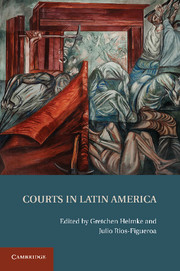Book contents
- Frontmatter
- Contents
- Contributors
- Acknowledgments
- Introduction
- 1 Institutions for Constitutional Justice in Latin America
- 2 Enforcing Rights and Exercising an Accountability Function
- 3 Strategic Deference in the Colombian Constitutional Court, 1992–2006
- 4 From Quietism to Incipient Activism
- 5 “Faithful Servants of the Regime”
- 6 Power Broker, Policy Maker, or Rights Protector?
- 7 Legalist versus Interpretativist
- 8 A Theory of the Politically Independent Judiciary
- 9 Courts, Power, and Rights in Argentina and Chile
- 10 Bolivia
- 11 The Puzzling Judicial Politics of Latin America
- Index
- References
5 - “Faithful Servants of the Regime”
The Brazilian Constitutional Court's Role under the 1988 Constitution
Published online by Cambridge University Press: 01 June 2011
- Frontmatter
- Contents
- Contributors
- Acknowledgments
- Introduction
- 1 Institutions for Constitutional Justice in Latin America
- 2 Enforcing Rights and Exercising an Accountability Function
- 3 Strategic Deference in the Colombian Constitutional Court, 1992–2006
- 4 From Quietism to Incipient Activism
- 5 “Faithful Servants of the Regime”
- 6 Power Broker, Policy Maker, or Rights Protector?
- 7 Legalist versus Interpretativist
- 8 A Theory of the Politically Independent Judiciary
- 9 Courts, Power, and Rights in Argentina and Chile
- 10 Bolivia
- 11 The Puzzling Judicial Politics of Latin America
- Index
- References
Summary
Latin America has witnessed an undeniable increase in the importance of courts in debates about policy, disputes concerning the rights of citizens and the duties of states, and controversies across (and within) branches of government. This raises a series of questions: What drives this change? Whose rights and interests are these courts protecting? Are they perhaps newly empowered by the need to police a more democratic separation of powers? Who benefits from the increasing intervention of courts in politics? Are courts acting autonomously or as agents of the executive, the legislature, or someone else? In this chapter, I propose a theoretical and conceptual scheme for getting at some of these questions. The framework takes into account both the institutional design of courts and their political context and seeks to explain which issues and whose interests the courts will protect with special solicitude. By way of illustrating its utility, I apply the scheme to the Supremo Tribunal Federal (STF), the highest constitutional court in Brazil.
Kapiszewski's chapter in this volume (Chapter 6) analyzes the same court, seeking to explain the mix of cases that are brought to the court as a function of the constitutional and socioeconomic opportunity structure. This chapter is focused primarily on how the court will respond in the cases that come before it. Our conclusions on how the court behaves are largely though not perfectly congruent; our explanations have some points of contact but address slightly different phenomena.
- Type
- Chapter
- Information
- Courts in Latin America , pp. 128 - 153Publisher: Cambridge University PressPrint publication year: 2011
References
- 12
- Cited by



